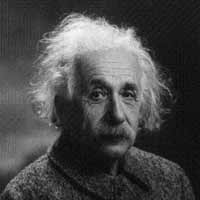Albert Einstein’s intimate confessions to fetch 16,000 dollars
Albert Einstein was one of the most extraordinary personalities of the 20th century. He was a great physicist and a distinctive philosopher, and many of his remarks still excite interest and discussion in the scientific world.

For instance, “Science without religion is lame, religion without science is blind.” The faithful and atheists interpret this aphorism differently. However, the scientist’s real attitude to religion is still a closed book. A document that has recently been made public will help to clarify the matter.
It goes about a letter that the creator of the theory of relativity wrote to German philosopher Eric Gutkind in 1954. This sample of the scientist’s philosophic thought has been kept in a private collection for over 50 years. Next week it will go on sale at a London auction and is expected to fetch 16,000 dollars.
However, the most interesting thing about the letter is not its price, but its contents. It is devoted to religion and expresses the scientist’s thoughts that may seem shocking to pious people.
“ The word god is for me nothing more than the expression and product of human weaknesses, the Bible a collection of honorable, but still primitive legends which are nevertheless pretty childish. No interpretation no matter how subtle can (for me) change this ,” Einstein wrote.
The letter written in German unveils even more sensational confessions. For instance, being a Jew and have once received a proposal to become the Israeli president, Einstein did not believe that the Jews are God’s favored people.
“ For me the Jewish religion like all others is an incarnation of the most childish superstitions. And the Jewish people to whom I gladly belong and with whose mentality I have a deep affinity have no different quality for me than all other people ,” the letter said.
Oxford scientist John Brooke who studied Einstein’s biography for a long time called for careful interpretation of the letter.
“Like other great scientists he does not fit the boxes in which popular polemicists like to pigeonhole him . It is clear for example that he had respect for the religious values enshrined within Judaic and Christian traditions ... but what he understood by religion was something far more subtle than what is usually meant by the word in popular discussion, ” Brooke said.
Brooke reminded that Einstein hated when he was call an atheist. The scientist’s vision of the universe was significantly more complicated and he did not confine himself to denying the existence of God. "The eternal mystery of the world is its comprehensibility ,” he used to say.
Several years ago another interesting document was publicized, which also enables researchers to look at Einstein’s life at an unusual angle. It was the diary of Einstein’s last lover Johanna Fantova.
She wrote about his struggle against old age and diseases, his political and general views, daily occupations and peculiarities of his love life. In this diary Einstein appears to be an ordinary man with his weaknesses and flaws. Fantova wrote that he felt partly responsible for the invention of the atomic bomb, which oppressed him.
Utro
Translated by Julia Bulygina
Pravda.ru
Subscribe to Pravda.Ru Telegram channel, Facebook, RSS!


